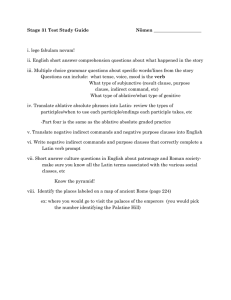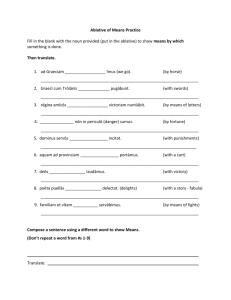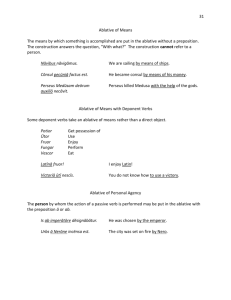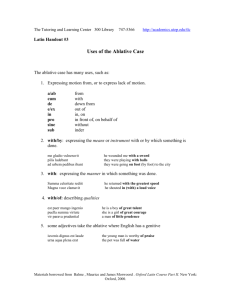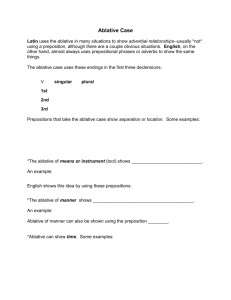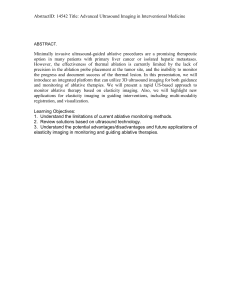Stage #31 Pensum Review Packet Nōmen ______________________
advertisement
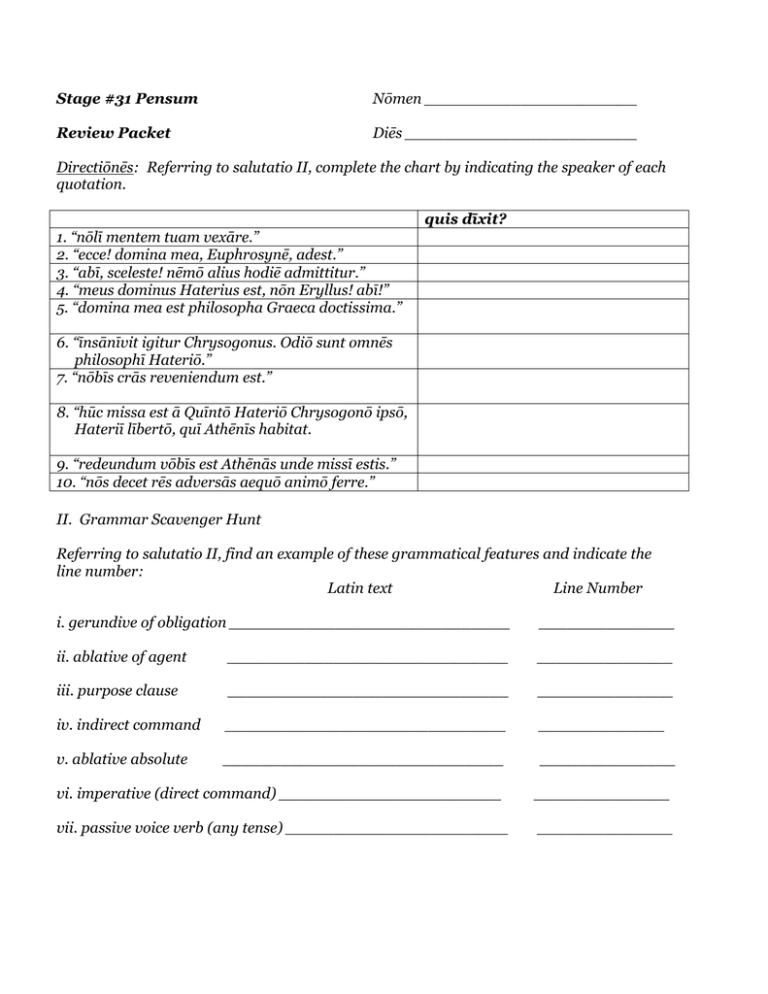
Stage #31 Pensum Nōmen ______________________ Review Packet Diēs ________________________ Directiōnēs: Referring to salutatio II, complete the chart by indicating the speaker of each quotation. quis dīxit? 1. “nōlī mentem tuam vexāre.” 2. “ecce! domina mea, Euphrosynē, adest.” 3. “abī, sceleste! nēmō alius hodiē admittitur.” 4. “meus dominus Haterius est, nōn Eryllus! abī!” 5. “domina mea est philosopha Graeca doctissima.” 6. “īnsānīvit igitur Chrysogonus. Odiō sunt omnēs philosophī Hateriō.” 7. “nōbīs crās reveniendum est.” 8. “hūc missa est ā Quīntō Hateriō Chrysogonō ipsō, Hateriī lībertō, quī Athēnīs habitat. 9. “redeundum vōbīs est Athēnās unde missī estis.” 10. “nōs decet rēs adversās aequō animō ferre.” II. Grammar Scavenger Hunt Referring to salutatio II, find an example of these grammatical features and indicate the line number: Latin text Line Number i. gerundive of obligation _____________________________ ______________ ii. ablative of agent _____________________________ ______________ iii. purpose clause _____________________________ ______________ iv. indirect command _____________________________ _____________ v. ablative absolute _____________________________ ______________ vi. imperative (direct command) _______________________ ______________ vii. passive voice verb (any tense) _______________________ ______________ Latin text viii. ablative of cause Line Number _____________________________ ______________ ix. present active participle ___________________________ ______________ x. perfect active participle ____________________________ ______________ III. Ablative Absolute Composition Practice Scribe Latine! Write the following ablative absolutes in Latin. Think about what type of ablative absolute you have: English Subordinate Clause Latin Ablative Absolute i. When the spear was thrown ______________________________ 2. After the house was destroyed _______________________________ 3. Since the temple was built _______________________________ 4. As the boys are running _______________________________ 5. After the letters were written _______________________________ 6. Although the men had been attacked _______________________________ 7. When the boy is begging _______________________________ 8. Since the ships were repaired _______________________________ 9. When the arch was set on fire _______________________________ 10. Since the guards are sleeping _______________________________ 11. After the shout was heard _______________________________ 12. Because the merchant was a citizen _______________________________ 13. Although the road was narrow _______________________________ Stage 31 Test Study Guide Nōmen _____________________ i. lege fabulam novam! ii. English short answer comprehension questions about what happened in the story iii. Multiple choice grammar questions about specific words/lines from the story Questions can include: what tense, voice, mood is the verb What type of subjunctive (result clause, purpose clause, indirect command, etc) What type of ablative/what type of genitive iv. Translate Latin sentences with ablative absolutes into proper English v. Translate ablative absolute phrases into Latin- review the types of to use each participle/endings each participle takes, etc participles/when -Parts four and five are the same as the ablative absolute graded practice vi. Translate negative indirect commands and negative purpose clauses into English vii. Short answer culture questions in English about patronage and Roman societymake sure you know all the Latin terms associated with the various social classes, etc viii. Identify the places labeled on a map of ancient Rome (page 224) ex: where you would go to visit the palaces of the emperors (you would pick the number identifying the Palatine Hill)
